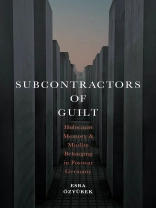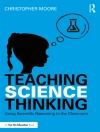At the turn of the millennium, Middle Eastern and Muslim Germans had rather unexpectedly become central to the country’s Holocaust memory culture—not as welcome participants, but as targets for re-education and reform. Since then, Turkish- and Arab-Germans have been considered as the prime obstacles to German national reconciliation with its Nazi past, a status shared to a lesser degree by Germans from the formerly socialist East Germany. It is for this reason that the German government, German NGOs, and Muslim minority groups have begun to design Holocaust education and anti-Semitism prevention programs specifically tailored for Muslim immigrants and refugees, so that they, too, can learn the lessons of the Holocaust and embrace Germany’s most important postwar democratic political values.
Based on ethnographic research conducted over a decade, Subcontractors of Guilt explores when, how, and why Muslim Germans have moved to the center of Holocaust memory discussions. Esra Özyürek argues that German society ‘subcontracts’ guilt of the Holocaust to new minority immigrant arrivals, with the false promise of this process leading to inclusion into the German social contract and equality with other members of postwar German society. By focusing on the recently formed but already sizable sector of Muslim-only anti-Semitism and Holocaust education programs, this book explores the paradoxes of postwar German national identity.
Table of Content
Introduction: German Holocaust Memory and the Redemptive Path toward Democracy
1. Rebelling against the Father, Democratizing the Family
2. Export-Import Theory of Muslim Antisemitism in Germany
3. Wrong Emotions / Wrong Empathy for the Holocaust
4. Subcontracting Guilt, Policing Victimhood
5. Visiting Auschwitz as Pilgrimage and as Shock Therapy
Conclusion: Can Muslims Flip the Script of the German Memory Theater?
About the author
Esra Özyürek is the Sultan Qaboos Professor of Abrahamic Faiths and Shared Values at the University of Cambridge. She is the author of
Being German, Becoming Muslim: Race, Religion, and Conversion in the New Europe (2015).












